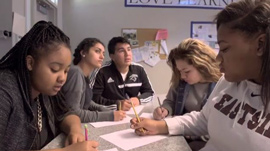Groupwork is an effective instructional strategy for achieving intellectual and social learning goals. It is a superior approach for conceptual learning, for creative problem solving, and for developing academic language proficiency. Socially, it can improve intergroup relations by increasing trust and friendliness. Most importantly, groupwork provides greater access to the learning tasks to more students with a wide range of academic skills and linguistic proficiency. It offers opportunities for such students to demonstrate what they have learned and for teachers to recognize their students’ intellectual growth and contributions.
Various models of groupwork, implemented from early elementary grades to graduate seminars, have proliferated. Many high-quality studies have been published of small- and large-scale interventions based on instructional strategies in which groupwork or cooperative learning are the main components. And yet, the perennial dilemma of groupwork persists.
Small task groups tend to develop hierarchies where some members are more active and influential than others. Students who have a high standing in an academic subject and/or are socially attractive are very likely to dominate the group interaction. Students who are perceived and who perceive themselves as less expert in the subject are reticent to engage and offer ideas. While the former continue to develop their knowledge and skills, the latter are missing out.
Patterns of unequal interaction are a major concern for educators.
- First, when students engage in a groupworthy task, learning emerges from the chance to talk, interact, and contribute to the group discussion. Unequal participation leads to unequal opportunities to learn.
- Second, unequal interaction, engendered by different societal status based on race, gender, or socioeconomic background, reinforces prejudices and damaging stereotypes.
- Third, unequal interaction interferes with the group’s productivity and the quality of its performance.
Based on decades of educational scholarship and effective implementation in a multitude of classrooms across grade levels and academic disciplines Complex Instruction—true to its name—offers a complex and ambitious pedagogical approach to create equitable classrooms. It emphasizes equal-status interactions among students and specifies the conditions under which teachers can establish and support such interaction.


